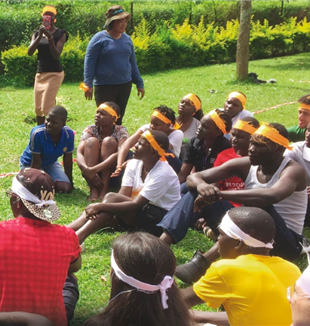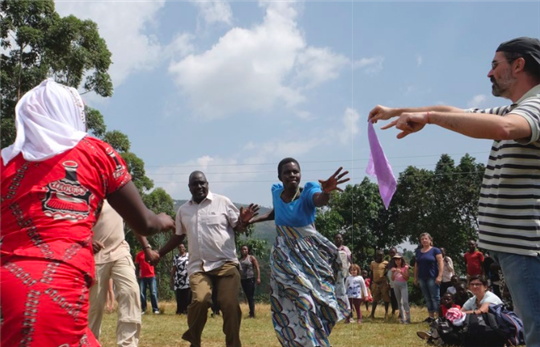
"I was born that day"
Stories told by students, the death of a young father and his wife’s witness, and the Muslim women who encountered Christianity... Perspectives from a Spanish priest after visiting Kampala and spending time with college students in Kenya.I arrived in Kampala a few days before the start of the Spiritual Exercises I preached for college students from all over Africa, which took place February 9 -11. There, I found a community reeling from the sudden death of Francesco Frigerio, an Italian who was well-loved by everyone, in a car accident. Just a few months before, he had helped us out with the CLU vacation in Uganda. He left behind a wife and three young children. This opened up a lot of questions for the students there, as I saw in the messages I received leading up to the Exercises. They told me the story of a new humanity that began to show itself in Sara, Francesco’s wife, who sustained the community with her certainty that “Francesco now sits at the heavenly banquet with our Lord.” I heard their witnesses of how they came together in vigil before his body was sent to Italy for burial. They told me about the carpenter who had worked with Francesco who, hearing the songs and seeing a serenity and strange joy during the wake, asked, “Don’t you cry in Italy when someone dear to you dies?” One of those present answered him, “In Italy, we despair in front of death. What you’re seeing is something exceptional. It’s called faith.”
With these facts before my eyes, and with a desire to address the questions the young people posed about death, I went to the International Meeting Point to meet “Rose’s women.” After an hour of singing and dancing, I asked them, “You say that you are free. Meeting Rose freed you. You knew Francesco well; he built the Luigi Giussani Primary and High School. For you, what is death? In other words, what does it mean for you to live?” I was surprised by the response of Teddy, a woman who started from her self-awareness rather than a theory about death. She said, “There is One who is making me in every instant. He is the master of life, so you can have faith even in the face of death.” I took notes. If what we live in every instant has nothing to do with death, we’ll live like every- one else and be left with explanations that don’t satisfy anyone.
On their knees. We had dinner at the Memores Domini house with three Muslim women who participate in the Meeting Point. They told us about how they “devour” Traces the second it arrives in Kampala and how they help the other women out in zealously selling the magazine. One of them, who was preparing to be baptized at the Easter vigil, told the story of her conversion. As she spoke, I started to feel a little uneasy, looking at the two other Muslim women. It was my European mentality at work: “Won’t they feel bad, since they’re still Muslim?” By the end of the evening, their faces had broken through my thoughts: they were so happy.
As we said our goodbyes, I looked in on a striking scene: the two Muslim women were on their knees in front of Rose. The next day, I asked her the meaning of the gesture. “It’s an expression of gratitude. As if to say, ‘May we stay here always; don’t abandon us,’” Rose told me. And then she went on to tell me about all the things that I, the wise “man of reason,” didn’t see. Those women were so happy to be able to come to her house, sit at the same table with white people, eat the same food on the same plates, to be served and be able to participate in the conversation, and even happier that we took an interest in them. They had truly discovered the value of their lives there. Before, they looked at themselves as others had: in their regular environment, black Muslim women are considered second-class. Those simple things, which were possible at Rose’s house, were unthinkable for them before. We were used to it, but for them, they were signs of a new, different humanity. One that brings us to our knees in awe.
“Good afternoon.” The next day, we had lunch at the home of a girl from the CLU who lived in a slum. She wanted us to celebrate with her, her passing to the next level in school. Our visit was a real event for her: “Auntie” Rose, Father Nacho, and their friends came to see her! We came to her humble home (“humble” falls short of describing that small room which houses five people). Everyone in the slum watched our strange entourage. “Where are they going?” Her look answered them: “To my house!” As we would be reminded during the Exercises, that young woman felt like Zacchaeus: today, salvation had entered her house. “He was seen and therefore saw,” was the title of the retreat.
After an 11-hour journey, we arrived the next day in Eldoret, Kenya, for the Exercises. The reflections I gave were enriched by the questions and witnesses from the students, as well as by what I had seen in my time in Kampala. It was easy to illustrate “being seen”: many of them seem to still be in the sycamore tree, being seen by “Auntie” Rose. One girl spoke about her life before climbing that tree. Everything was against her; she hated everything, even the day she’d been born. As well as God. No one loved her as she was. She had tried to commit suicide three times. She saw her brother, however, facing the same circumstances at home (an alcoholic father, among other things) in a different way. So she agreed to go with him to School of Community. This is how she described it: “It was the second week of the second semester of my first year in high school [described with the precision of the encounter John and Andrew had with Christ: it was four in the afternoon]. I went to the foyer where they hold School of Community, and I was early. ‘Auntie’ Rose came in and saw me there. She fixed me with her gaze– she normally does this with new people–and I felt my heart beating fast. Then, her gaze softened and she smiled at me. She bid me, ‘Good afternoon.’ I was so in shock and felt so small that I didn’t manage to respond. But that gaze left me speechless. In my whole life, no one has ever smiled at me that way. It was such a piercing gaze that it broke down the walls of my past and opened wide the present in front of me. It was a gaze that told me that I, too, can be loved exactly as I am. As if it said to me, ‘You are important.’ I heard Someone calling me to follow Him through that gaze. From that moment on, I decided to follow. I felt like I had found the place I belong. I can say that God’s grace reached me when I was 14 years old. I can say that I was ‘born’ when I was 14, because that was the moment in which I understood the true meaning of my life. I started to understand who God is for me, and the great chasm between me and my origin was bridged. The Movement gave me back myself, which I had lost. I want to start over and stop measuring my life. Like Fr. Giussani, I don’t want my life to be useless.”
Getting lost. We have everything in that first encounter, Fr. Giussani reminds us, but we understand what that “everything” is through our circumstances. I’ve known some of these young people for five years now; I’ve accompanied them from high school into the university. It’s beautiful to see them passing “from the evidence of the first encounter to conviction.” This is a step that Zacchaeus had to face the next day when, after getting angry with his wife, he found himself pained by it when he thought of Jesus.
One of the students told us how upset he was when two friends of the community distanced themselves after having followed for a while. “Do you also want to leave?” comes to mind. “It’s the time of the person,” Fr. Giussani told us. We have all the tools we need to judge; we shouldn’t be afraid. The student started to tell us about how he decided to take a “break” from School of Community and the choir... but it didn’t last long. “I saw how I got lost in my ideology,” he explained. “I couldn’t manage without the gaze of ‘Auntie’ Rose, Alberto, and Seve.” The heart at work. Which is the starting place for a true verification within university life.
In class. During a lecture, an economics professor explained the pyramid of human needs. The base of the pyramid was our basic needs. Once they are satisfied, you find the need for security and then you go on up to the top of the pyramid, where one’s needs are completely fulfilled. One young man raised his hand. “Professor, in our experience, it’s not true that our needs are completely satisfied.” The class broke out into a lively discussion. The student felt compelled to tell the class about his experience. All of it. Afterwards, the professor, who had become curious, asked him, “But wait, what is the source of your worldview?” The student told him about Giussani and gave him his copy of Why the Church?
This 50-year-old European priest was convinced, once again, that to prepare for the Exercises it’s better to let oneself be struck by what happens, rather than arriving with ready-made reflections. The Unnamed, standing stubbornly at the door of Cardinal Federigo, is more effective than the “I already know everything” of our Kantian mentality...